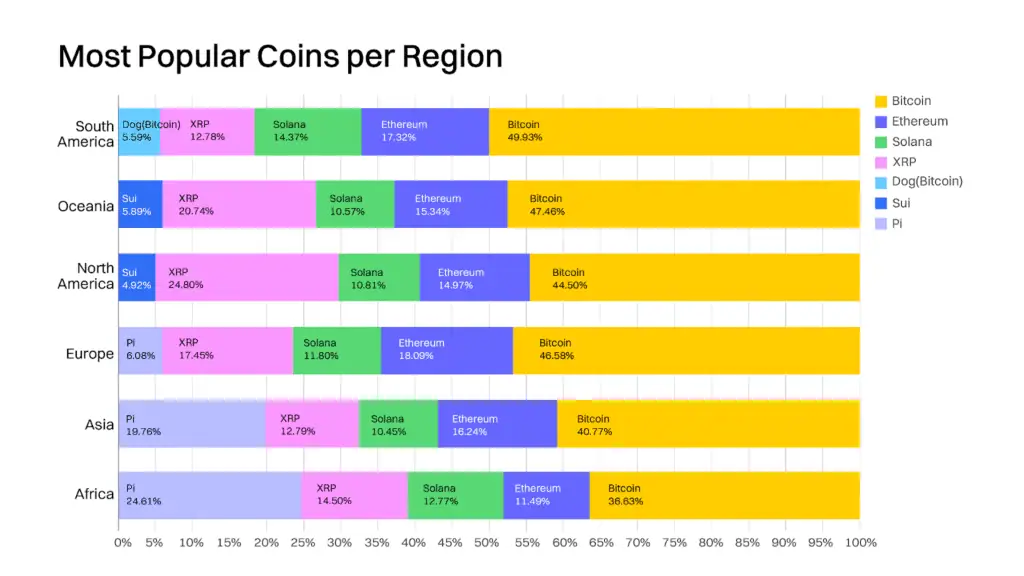
According to the CMC 2025 Q2 report, Bitcoin and Ethereum lead global preference across all continents, surpassing memecoins and emerging tokens. Their dominance demonstrates maturity, institutional adoption, and cross-platform trust.
In a crypto ecosystem increasingly saturated with viral proposals, speculative narratives, and emerging tokens promising disruption, two assets continue to set the pace with a robustness that transcends market cycles and digital fads.
Bitcoin (BTC) y Ethereum (ETH), far from losing prominence in the face of the rise of memecoins or recently emerged projects, have consolidated their position as the most popular cryptocurrencies on each continent, according to the report CMC 2025 Q2 published by CoinMarketCap.
Buy BTC and ETH now at Bit2MeThe regional chart included in the report reveals a clear pattern: while alternative tokens are gaining some traction in specific markets, BTC and ETH maintain a dominant and transversal presence, both in the institutional and retail segments. This preference is not homogeneous, and in some regions such as the United States or Africa, other assets such as XRP or Pi Network manage to position themselves above Ethereum. However, Bitcoin's global leadership is unquestionable, with percentages exceeding 49% in South America and remaining above 36% even in the most fragmented markets.
This article explores the reasons behind this consolidation, the contrast with other emerging cryptocurrencies, and how the narrative of maturity, utility, and adoption continues to favor the two giants of the crypto ecosystem.
Bitcoin and Ethereum: Cross-continental dominance
Bitcoin, created in 2009 by the enigmatic Satoshi Nakamoto, has become the most recognized and adopted digital asset in the world. Its narrative as a store of value, its planned scarcity, and its growing institutional acceptance have positioned it as the absolute benchmark on every continent. According to the CMC 2025 Q2 report, BTC leads regional preference With figures ranging from 36,63% in Africa to an impressive 49,93% in South America, this consistency reflects a growing trust among both large funds and individual users.
Ethereum, for its part, launched in 2015 by Vitalik Buterin, has been the driving force behind innovation in smart contracts, decentralized applications, and the DeFi ecosystem. Although its popularity doesn't reach Bitcoin levels in all regions, ETH remains the second most relevant cryptocurrency globallyIts presence is especially strong in Europe, South America, and Oceania, where it exceeds 15% preference among crypto users.

Both cryptocurrencies have managed to penetrate both institutional and retail markets, consolidating a cross-platform adoption that transcends geographies, segments, and hype cycles. Their maturity, liquidity, and real utility make them pillars of the ecosystem, even compared to more recent proposals that appeal to virality or speculation.
Bit2Me: Your secure access to BTC and ETHRegional Contrasts: XRP and Pi Network on the Preference Map
While Bitcoin and Ethereum dominate the global landscape, the CoinMarketCap report also reveals important nuances in the regional distribution of preferences.
In the United States, for example, XRPRipple's native token, Ethereum, has surpassed Ethereum in popularity, positioning itself as the second most sought-after asset after Bitcoin. This phenomenon can be explained by the institutional narrative Ripple has cultivated in the financial sector, as well as its prominence in regulatory debates that have captured the attention of the American public.
In Asia and Africa, PiNetwork Pi is emerging as an unexpected competitor. This project, which promotes mobile mining and financial inclusion, has managed to capture massive interest in regions where access to traditional crypto infrastructure is limited. Although Pi doesn't surpass Bitcoin in any region, its presence in the top three in Asia and Africa indicates a growing demand for accessible and mobile solutions. In Africa, for example, Pi competes directly with Ethereum, which is left behind by proposals more adapted to the local context.
On the other hand, Solana It also stands out as a solid alternative in all regions, especially in South America (14,37%), Europe (11,80%), and Africa (12,77%). Its speed, scalability, and DeFi/NFT ecosystem have allowed it to establish itself as the third most popular option in several markets, surpassing Ethereum in some cases.
However, what is clear is that Neither Solana nor emerging tokens manage to displace BTC's leadership., reinforcing the idea that maturity and confidence remain key factors in asset selection.
BTC and ETH dominate: enter today with Bit2MeBeyond the hype: reasons behind BTC and ETH's leadership
The dominance of Bitcoin and Ethereum is related to the fact that both assets have built a solid narrative based on utility, adoption, and technological evolution. Bitcoin, with its predictable monetary policy and growing integration into traditional financial products, represents a serious alternative to inflation and macroeconomic uncertainty. Its presence on every continent reflects a confidence that transcends cultures and levels of development.
Ethereum, for its part, has been the epicenter of crypto innovation. From the explosion of ICOs to the rise of DeFi and NFTs, ETH has demonstrated a unique ability to adapt and lead new trends. The migration to Proof of Stake, the expansion of Layer 2 solutions, and the consolidation of its ecosystem position it as the most versatile asset on the market. Although its popularity varies by region, its technological relevance keeps it a key component in any crypto portfolio.
The CMC 2025 Q2 report also highlights that, despite the growth of emerging tokens and memecoins, they have not yet managed to consolidate themselves as regional leaders, suggesting that, although the crypto ecosystem remains fertile for experimentation, Users tend to favor assets with a proven track record, liquidity, and utility..
In short, Bitcoin and Ethereum dominate not only by age or market capitalization, but by having built a coherent, institutionally supported, and technologically relevant narrative. Their global leadership, albeit with regional nuances, confirms that in a market saturated with options, trust remains the most valuable asset.
Don't be left behind: Bit2Me connects you to the crypto world


